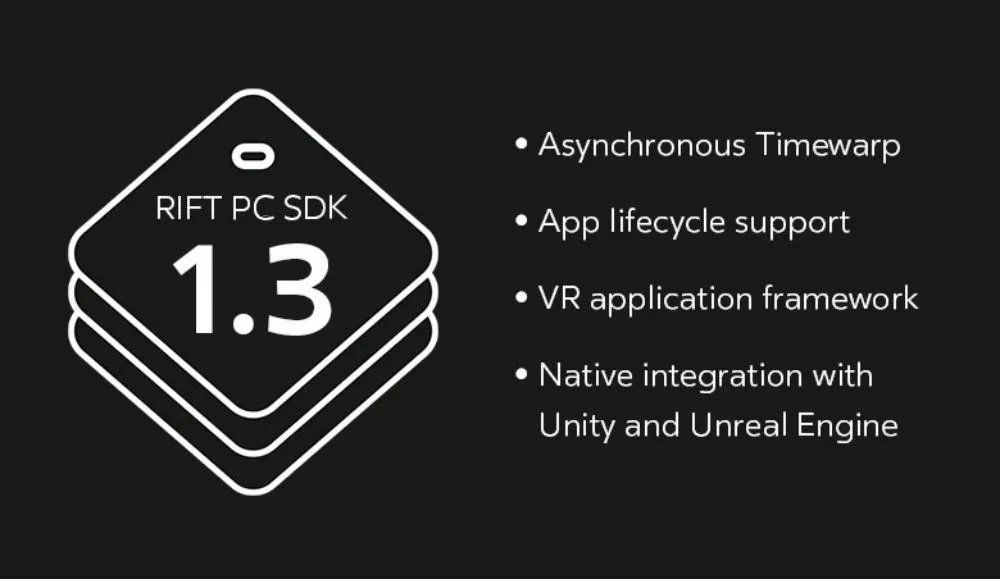On March 28, the much anticipated Oculus Rift officially launched. Amongst all the hullabaloo concerning the hardware and games another revelation has gone relatively unnoticed: Oculus SDK 1.3. This update to the Oculus developer tools was announced on the same day as the Rift launch via an official blog post. The post contains some useful information for Rift developers and consumers alike, but one bit of new information in particular is frustrating the CEO of Epic Games, Tim Sweeney.
Let’s get started looking through the changes and why the man in charge of one of the most important VR experience creation toolsets is disappointed with Oculus.
Social
Along with SDK 1.3, Oculus announced new advancements to its social platform. According to Oculus:
“We’re also releasing the Oculus Platform SDK 1.0, which lets you add features like leaderboards, multiplayer matchmaking, and peer-to-peer networking to your games and apps…”
Increased multiplayer support is an absolute must for community building and long-term adoption. Oculus is clearly hoping to make it as easy as possible for developers to include these coveted features in their upcoming titles.
Unleash The Indies
Midway down the post it is revealed that the Oculus Store will be establishing “Experiences” and “Early” access portals. Steam, which is made by Valve and powers a competing headset, boasts a similar open door/community development section on its platform. These two developer options from Oculus demonstrate an attempt to not get left behind when it comes to indie and small-team creations.
According to Oculus: “Concepts evolved out of Oculus Share, and it’s a place to publish your innovative experiments and tech demos. Early Access is for playable VR experiences that are still in development but are ready for feedback from the community.”
The More The Merrier?
Until March 28 we didn’t know how restrictive Oculus planned to be when it came to content for the Rift. Would the Oculus Store be the only place to obtain games and experiences that would successfully run on this enticing new hardware? Now it seems we have an answer:
“The Oculus platform and store are designed to provide the best VR experience and content, but we also recognize that people will want to use apps that aren’t available on the Oculus platform or in the store.
As a developer, you don’t have to be in the Oculus Store — you can sell outside, and when you do that you can you use your own IAP if you prefer, and we don’t take a cut. You can also request keys (royalty free) to sell your Oculus PC app on other stores, while making it available to the community through the Oculus platform.
If you’d like to ship outside the Oculus platform using the SDK, you can. People can access this content by enabling the “Unknown Sources” setting in the Oculus desktop app. There are considerations when building Oculus PC apps on other platforms: for example, customers must be able to return Home and see Oculus platform overlays and notifications, including the health and safety notice.”
Some in the industry aren’t too happy with this approach.
This Is Unreal
Epic Games founder Tim Sweeney took to the Internet to voice his disappointment with the Rift’s content policy on Monday afternoon. In a series of tweets, Sweeney denounced Oculus for treating his own Unreal platform and other content providers as “second class citizens.”
Very disappointing. @Oculus is treating games from sources like Steam and Epic Games as second-class citizens. https://t.co/8rFhkECXnR
— Tim Sweeney (@TimSweeneyEpic) March 28, 2016
Sweeney specifically took issue with the proposed key request system outlined in the quote above.
In what possible sense is this an “open platform”? Developers have to “request keys” for @Oculus DRM. @Polygon https://t.co/q8rzqTpIqB
— Tim Sweeney (@TimSweeneyEpic) March 28, 2016
Then this.
Open pic.twitter.com/N8QxmknKK4
— Tim Sweeney (@TimSweeneyEpic) March 28, 2016
And this.
On a purely practical note, how is #WebVR supposed to work when @Oculus is blocking Chrome, Firefox, and Edge by default?
— Tim Sweeney (@TimSweeneyEpic) March 29, 2016
We’ll keep following this and provide updating coverage, including if someone at Oculus responds.






























